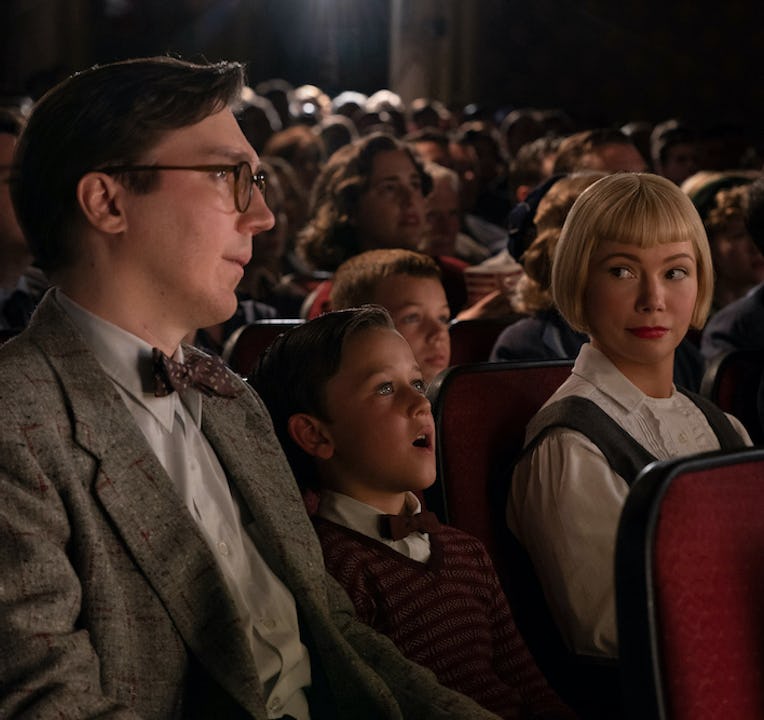‘The Fabelmans’ Is Steven Spielberg’s Love Letter to Himself
Based on the director’s life, the film has no stakes

For decades, Steven Spielberg has been threatening audiences with a film about his upbringing and how his parents’ divorce shaped his life. In a 1999 interview with the New York Times Magazine, he discussed his intention to make an autobiographical film written by his sister Anne. He confessed that what was holding him back, at that point, was fear: “That my mom and dad won’t like it and will think it’s an insult and won’t share my loving yet critical point of view about what it was like to grow up with them.''
More than two decades later, Spielberg has released The Fabelmans, co-written by Spielberg and frequent collaborator Tony Kushner, a film that by his own admission is based on his own life, growing up as a young film enthusiast in the 1950s and ’60s. First premiering at the Toronto International Film Festival ahead of its Thanksgiving release date, The Fabelmans may be his most personal film to date, but it might also be one of his most hollow and underwritten.
The film focuses on Sammy Fabelman, a kid who loves movies. If you can’t tell by his last name, he was born to tell stories. Sammy’s love for movies is inculcated when his parents — the whimsical and kooky pianist mother Mitzi and genius STEM father Burt — take him to see his first film. They fear Sammy will be scared of the big screen images, but he is enthralled. His mother soon realizes that her son might better understand the world around him from behind a camera, and in short order he begins filming everything he can find.
Spielberg spends the first two-thirds of The Fabelmans showing the audience how amazing the Fabelmans are. Mitzi (Michelle Williams) is a natural leading lady for a budding filmmaker to adore. She is beautiful, flighty, wide-eyed, silly, and manic. Burt (Paul Dano), on the other hand, takes on the role of the pragmatic breadwinner. While he makes it clear throughout the film that he believes filmmaking is just a hobby for Sammy and shouldn’t be seen as a career choice, he is still supportive of his son and goes so far as to help Sammy make most of his amateur films. Burt’s best friend and employee rounds out the extended family as playful and fun Uncle Bennie (Seth Rogen), loved by all four Fabelman children.
There is a feeling of frictionlessness for much of the film, as we are shown montages of this kooky family’s boundless love and the ease with which they lead their seemingly idyllic lives. Sammy is gifted expensive cameras and has every resource to explore his talents. Even when conflict arises and the cracks in the family’s picture-perfect facade finally begin to appear, it still feels like The Fabelmans has no real stakes. After all, no matter what, we know what happens to Sammy: He becomes Steven Spielberg.
Aside from Sammy, whose precious interiority and innate brilliance take center stage, nearly every single character in this film is underwritten — we are given little to no insight on who anyone is outside of Sammy’s limited point of view, most glaringly so Mitzi. Williams as Mitzi is perhaps one of the most confounding performances of the actress’s prestigious career. Mitzi inexplicably breaks into a somber dance for her family, and everyone around her treats her like she is going to break. Throughout his whole childhood, Sammy is told by his father and Uncle Bennie that he needs to make films because they’re the only things that make his mom happy, but we never get a clear understanding of why. Mitzi’s behavior and psychology are largely left unexplored — something about suppressing her art and thus herself — leaving us with little option but to shrug and put it down to being a woman in the 1950s.
As the film picks up, tensions do arise eventually. Mitzi and Burt’s marriage dissolves, after they are finally forced to confront a truth that neither one wanted to admit. This is when it becomes clearest that what The Fabelmans most suffers from is the unshakeable feeling that Spielberg was attempting to do right by his and his family’s story, and in doing so, made a film that does not feel fully honest. Don’t dismiss these people as villains, the movie seems to beg with every conflict. In Sammy’s parent’s divorce, being a career-driven square is assigned the same level of wrongdoing as some very straightforward and cruel infidelity. A high-school bully redeems his asshole behavior by being really, really good-looking in a Senior Skip Day doc. Even some of Sammy’s worst decisions are given the excuse of his inner turmoil; he doesn’t face any real obstacle to his dreams, other than his own feelings, so it feels more like watching Dawson Leery than Steven Spielberg.
What should be a love letter to filmmaking ends up being a love letter from Spielberg to himself — aren’t we so lucky he decided to pick up a camera? Sammy’s films are little winks at Spielberg’s later films. He shoots a war scene, a beach scene, and some horror — if those sound familiar, it’s because they’re supposed to be. What Spielberg does with The Fabelmans ends up being more frustrating than pleasurable. Here is a movie that is technically perfect and beautiful to look at, but, for all its sentiment and supposed feeling, it has little to say beyond “follow your dreams.”